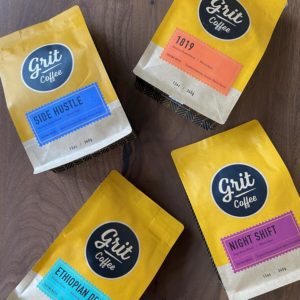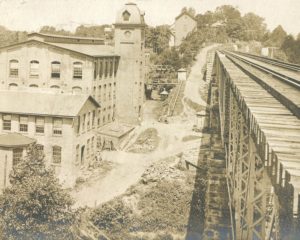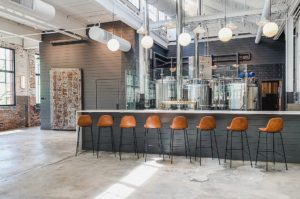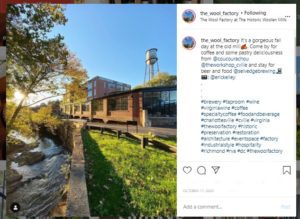Entrepreneurs Brad Uhl (MBA ’15), Dan FitzHenry (MBA ’18) and Brandon Wooten (UVA ’04) have capitalized on their love of UVA to create some pretty incredible Charlottesville community staples. The trio’s recent portfolio includes six Grit coffee locations and The Wool Factory, a new brewery-bakery-event venue-hospitality-hub that was originally owned by Thomas Jefferson that featured working mills and later produced military uniforms during the Civil War.
Ten years ago, the UVA alumni founded a design firm called ID Company, which was designed to serve other businesses though web development, marketing and rebranding.

1819 Medium Roast Blend: An ode to our alma mater, 1819 is a celebration of the founding spirit and the pursuit of excellence. With flavors of toasted almond, vanilla, and a subtle hint of black cherry this blend is great for sipping on The Lawn or cheering on the Hoos.
UVAToday reporter Whitelaw Reid notes, “On the surface, the businesses don’t seem as if they would be related, but, interestingly, they have all been designed to work in tandem with each other.”
In their recent interview, the founders describe their symbiotic approach to entrepreneurship, and give a nod to the ways the Darden learning experience shaped their business strategies in some unexpected ways.
Highlights from the UVAToday interview below – read the full article here.
Q. Can you talk about the synergy of the businesses and why they work so well together? Was this by design or did it just sort of work out that way?
Brandon Wooten: All of our businesses have grown out of relationships, and all complement each other in some way. I met Brad and we complemented each other’s skill sets and it was fun to see the sum of those parts help others as we provided design and brand management for clients. We started ID Company to eventually do those same things for ourselves and very early on realized that we couldn’t do that without surrounding ourselves with talented and passionate people. The ‘ID’ stands for “integrated design” – in other words, ID Company was always meant to be a design arm integrated into a larger company.
When Dan joined us, he brought the operational piece we needed to grow. Along the way, we’ve partnered up with more and more talented people, which has allowed us to grow as a company.
Q. Can you take me through some specifics of how your businesses are mutually beneficial to each other?
Dan FitzHenry: We are fortunate to work with incredibly talented people in all of our companies. One thing we’ve been able to do is find good people who are great at what they do, and plug them into a structure that allows them to thrive. We can plan and map out as much as we want, but a lot of what we’ve built has come together by jumping at the right opportunity at the right time when the right partner comes along.

The Wool Factory, historic photo
Our businesses are symbiotic because of connections that naturally flow from one opportunity into the next, but it also takes discipline not to stray too far away from what we’ve built and commit to an opportunity that would actually distract from what we’re already doing.
The advantage of the symbiosis between our businesses is that everyone gets to where they want to be faster than if they did it on their own. For example, we didn’t roast our own coffee in the early days of Grit’s existence, but it was long a goal of ours. When the opportunity to hire a very talented coffee roaster presented itself, it meant building something completely new that we had never done before. Because we had four shops at the time, that created immediate demand for the roastery’s product, which then lowered the risk of standing up a coffee roastery from scratch, which then increased our margins on coffee sales at our shops.

Selvedge Brewing, The Wool Factory
We’ve since built out the wholesale and e-commerce side of our business on top of that, in addition to growing our own retail footprint.
The same thing happened when we had the opportunity to hire an incredible executive pastry chef for The Wool Factory. If you took each side in a vacuum, it probably wasn’t a perfect fit. At the time, we weren’t really planning on dedicating resources to starting a bakery operation, and she was interested in starting her own brand, but would be starting from scratch. By working together, everyone was able to get where they wanted to go much faster, so we formed a joint venture called Cou Cou Rachou.
Q. What was your UVA experience like, and how do you think it prepared you for what you are doing now? Any professors or classes that inspired you?
Brandon Wooten: I loved my time at UVA and continue to relish the friendships I was able to make. I sang in The Virginia Gentlemen and was able to travel to some amazing places and experience a level of food and hospitality that I don’t know that I would have been exposed to otherwise. Those experiences definitely shaped my journey with food and hospitality.
I didn’t quite have a grasp for what I wanted to do post-graduation, so I ended up just taking classes that I enjoyed and were interesting. I remember Architecture 101 being a class that opened my eyes to different ways of seeing things.
Brad Uhl: In undergrad, I started out in the Engineering School and ultimately wound up in econ, primarily because I liked the idea of a more generalist approach. “Product X” and “Price Y” always felt like it left so many doors open when compared to a more defined field or area of expertise. I learned a lot about myself in that regard once I realized how much I liked being able to plug into any type of business instead of a specific one.
I decided to go to Darden to gain some of the experience I felt I had missed not leaving Charlottesville, and it definitely opened my eyes to the possibilities of finance, small business, entrepreneurship, etc. in a whole new way.

The Wool Factory, October 2020
A mentor once challenged me to stop complaining about constantly feeling like I was spinning plates, when in fact I liked being a “plate spinner.” Once I became more comfortable owning that, it made everything a lot more fun, and it’s also helped us figure out how to craft a career around that particular skillset. I like problem-solving and making sense of what otherwise seems like chaos, and most of what we do is just that.
Dan FitzHenry: My experience at Darden was one of the most valuable learning experiences I’ve had. The program gave me the hard science of business, from accounting to leadership to corporate finance to operations and everything in between. The breadth of knowledge the Darden professors bring to the program is incredible. Additionally, I was surrounded by my fellow students who had different experiences, different ways of thinking and approaching problems, and were generally some of the best people I’ve had the good fortune to be around. I learned as much from them as I did from our professors.
I never thought it would be the case while I was learning it, but the professor and class that has stuck with me the most is accounting, taught by Paul Simko. Accounting is important when you run one business. When you run several separate, yet interconnected businesses, you become very familiar with the real-world implications of even the most arcane accounting principles Professor Simko teaches. It isn’t the fun, exciting part of running a business, but accounting touches every aspect of everything we do, and it’s crucial to get right.
Read the full article on UVAToday.
(Contributed photos via UVAToday and thewoolfactory.com)
Learn more about Grit Coffee and The Wool Factory.
Be sure to consult the Latest News regularly for the most updated news releases and media hits. Check out faculty thought leadership published on Ideas to Action. And stay connected with us via social media: Facebook, Instagram, LinkedIn, Twitter, WeChat
The post Entrepreneurial Alums Embrace UVA Founding Spirit first appeared on Discover Darden.
More...
Ten years ago, the UVA alumni founded a design firm called ID Company, which was designed to serve other businesses though web development, marketing and rebranding.

1819 Medium Roast Blend: An ode to our alma mater, 1819 is a celebration of the founding spirit and the pursuit of excellence. With flavors of toasted almond, vanilla, and a subtle hint of black cherry this blend is great for sipping on The Lawn or cheering on the Hoos.
UVAToday reporter Whitelaw Reid notes, “On the surface, the businesses don’t seem as if they would be related, but, interestingly, they have all been designed to work in tandem with each other.”
In their recent interview, the founders describe their symbiotic approach to entrepreneurship, and give a nod to the ways the Darden learning experience shaped their business strategies in some unexpected ways.
Highlights from the UVAToday interview below – read the full article here.
Q. Can you talk about the synergy of the businesses and why they work so well together? Was this by design or did it just sort of work out that way?
Brandon Wooten: All of our businesses have grown out of relationships, and all complement each other in some way. I met Brad and we complemented each other’s skill sets and it was fun to see the sum of those parts help others as we provided design and brand management for clients. We started ID Company to eventually do those same things for ourselves and very early on realized that we couldn’t do that without surrounding ourselves with talented and passionate people. The ‘ID’ stands for “integrated design” – in other words, ID Company was always meant to be a design arm integrated into a larger company.
When Dan joined us, he brought the operational piece we needed to grow. Along the way, we’ve partnered up with more and more talented people, which has allowed us to grow as a company.
Q. Can you take me through some specifics of how your businesses are mutually beneficial to each other?
Dan FitzHenry: We are fortunate to work with incredibly talented people in all of our companies. One thing we’ve been able to do is find good people who are great at what they do, and plug them into a structure that allows them to thrive. We can plan and map out as much as we want, but a lot of what we’ve built has come together by jumping at the right opportunity at the right time when the right partner comes along.

The Wool Factory, historic photo
Our businesses are symbiotic because of connections that naturally flow from one opportunity into the next, but it also takes discipline not to stray too far away from what we’ve built and commit to an opportunity that would actually distract from what we’re already doing.
The advantage of the symbiosis between our businesses is that everyone gets to where they want to be faster than if they did it on their own. For example, we didn’t roast our own coffee in the early days of Grit’s existence, but it was long a goal of ours. When the opportunity to hire a very talented coffee roaster presented itself, it meant building something completely new that we had never done before. Because we had four shops at the time, that created immediate demand for the roastery’s product, which then lowered the risk of standing up a coffee roastery from scratch, which then increased our margins on coffee sales at our shops.

Selvedge Brewing, The Wool Factory
We’ve since built out the wholesale and e-commerce side of our business on top of that, in addition to growing our own retail footprint.
The same thing happened when we had the opportunity to hire an incredible executive pastry chef for The Wool Factory. If you took each side in a vacuum, it probably wasn’t a perfect fit. At the time, we weren’t really planning on dedicating resources to starting a bakery operation, and she was interested in starting her own brand, but would be starting from scratch. By working together, everyone was able to get where they wanted to go much faster, so we formed a joint venture called Cou Cou Rachou.
Q. What was your UVA experience like, and how do you think it prepared you for what you are doing now? Any professors or classes that inspired you?
Brandon Wooten: I loved my time at UVA and continue to relish the friendships I was able to make. I sang in The Virginia Gentlemen and was able to travel to some amazing places and experience a level of food and hospitality that I don’t know that I would have been exposed to otherwise. Those experiences definitely shaped my journey with food and hospitality.
I didn’t quite have a grasp for what I wanted to do post-graduation, so I ended up just taking classes that I enjoyed and were interesting. I remember Architecture 101 being a class that opened my eyes to different ways of seeing things.
Brad Uhl: In undergrad, I started out in the Engineering School and ultimately wound up in econ, primarily because I liked the idea of a more generalist approach. “Product X” and “Price Y” always felt like it left so many doors open when compared to a more defined field or area of expertise. I learned a lot about myself in that regard once I realized how much I liked being able to plug into any type of business instead of a specific one.
I decided to go to Darden to gain some of the experience I felt I had missed not leaving Charlottesville, and it definitely opened my eyes to the possibilities of finance, small business, entrepreneurship, etc. in a whole new way.

The Wool Factory, October 2020
A mentor once challenged me to stop complaining about constantly feeling like I was spinning plates, when in fact I liked being a “plate spinner.” Once I became more comfortable owning that, it made everything a lot more fun, and it’s also helped us figure out how to craft a career around that particular skillset. I like problem-solving and making sense of what otherwise seems like chaos, and most of what we do is just that.
Dan FitzHenry: My experience at Darden was one of the most valuable learning experiences I’ve had. The program gave me the hard science of business, from accounting to leadership to corporate finance to operations and everything in between. The breadth of knowledge the Darden professors bring to the program is incredible. Additionally, I was surrounded by my fellow students who had different experiences, different ways of thinking and approaching problems, and were generally some of the best people I’ve had the good fortune to be around. I learned as much from them as I did from our professors.
I never thought it would be the case while I was learning it, but the professor and class that has stuck with me the most is accounting, taught by Paul Simko. Accounting is important when you run one business. When you run several separate, yet interconnected businesses, you become very familiar with the real-world implications of even the most arcane accounting principles Professor Simko teaches. It isn’t the fun, exciting part of running a business, but accounting touches every aspect of everything we do, and it’s crucial to get right.
Read the full article on UVAToday.
(Contributed photos via UVAToday and thewoolfactory.com)
Learn more about Grit Coffee and The Wool Factory.
Be sure to consult the Latest News regularly for the most updated news releases and media hits. Check out faculty thought leadership published on Ideas to Action. And stay connected with us via social media: Facebook, Instagram, LinkedIn, Twitter, WeChat
The post Entrepreneurial Alums Embrace UVA Founding Spirit first appeared on Discover Darden.
More...
